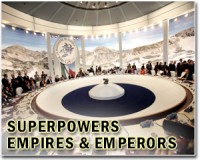| . |  |
. |
Washington (AFP) Feb 14, 2010 President Barack Obama's upcoming meeting with the Dalai Lama has already angered China, but beyond the diplomatic tussle lies a running quandary: Can foreign pressure sway Beijing on Tibet? Obama plans to receive the Tibetan spiritual leader on Thursday at the White House, ignoring China's protests. The National Endowment for Democracy, which is funded by the US Congress, will also present the Dalai Lama with a medal. Obama avoided meeting with the Dalai Lama last year in hopes of starting off his relationship on a good foot with China, which presses other nations to ostracize the internationally respected Buddhist monk. While the White House said Obama will see him in the Dalai Lama's role as a religious leader, experts believe the exiled Tibetan leadership also has a strategy -- to keep attention on China's treatment of the Himalayan region. "The Chinese are increasingly trying to put pressure on the Dalai Lama to stop these visits so it's obviously something they're concerned about," said Robert Barnett, director of the Modern Tibetan Studies Program at Columbia University. "But it's also been very effective for the Tibetan side and also the American agenda in that it does seem to be something that gets the Chinese to the table," he said. China recently held the first round of talks in more than a year with envoys of the Dalai Lama, who fled Tibet for India in 1959 amid a failed uprising against Chinese rule in his homeland. But Barnett added: "What it doesn't seem to do is to bring the Chinese into making concessions in the talks -- that seems to be a long way off." Both sides reported wide gaps in the talks, with China renewing charges that the Dalai Lama was a separatist. The Dalai Lama has repeatedly said he is only seeking greater freedoms for Tibetans under Chinese rule. Elliot Sperling, an expert on Tibet at Indiana University, said that China appeared set on dragging out the periodic talks until the 74-year-old Dalai Lama dies -- and with him, Beijing hopes, the Tibetan cause. "The Dalai Lama and the people around him have refused to realize this and that the talks have a strategic value for China -- they're useful for thwarting criticisms as to why isn't the Chinese government talking to the Dalai Lama," Sperling said. "China feels that it has all the cards and it doesn't see any reason at all to compromise," he said. He said that China felt emboldened after protests in Tibet in March 2008 -- and foreign criticism of Beijing's handling of them -- failed to derail the Olympic Games later that year. Instead of seeking meetings with foreign leaders and talks with China, the Dalai Lama may be better off to realize that a solution is unlikely in his lifetime, Sperling said. "The least he could do would be to preserve the integrity of the movement," Sperling said. "He has already gone to the length of saying he recognizes Tibet as part of China, something a large segment if not the majority of Tibetans do not agree with." But Barnett said that critics of the Dalai Lama's strategy offered no alternatives. He noted that China was facing growing pressure on issues ranging from climate change to Internet censorship to Taiwan. The United States last month agreed to sell 6.4 billion dollars in weapons to Taiwan, which Beijing claims. "Suddenly Western powers are looking a little more resolute in their attitude to China," Barnett said. "This might not last, it might not produce change and it might make China more assertive, but China will have to consider which of these issues is most important." Jeffrey Hopkins, an emeritus professor at the University of Virginia who was formerly the Dalai Lama's chief English interpreter, said that the globally famous monk felt personally compelled to raise the grievances of his people. "One of his prime responsibilities is the welfare of the Tibetan people and I know he feels a great burden for not having succeeded more in that task," Hopkins said. "He doesn't give up. He's not that kind of person," he said.
Share This Article With Planet Earth
Related Links Learn about the Superpowers of the 21st Century at SpaceWar.com Learn about nuclear weapons doctrine and defense at SpaceWar.com
 Worried Japan braces for global third spot after China
Worried Japan braces for global third spot after ChinaTokyo (AFP) Feb 15, 2010 Japan has dodged the bullet for now but may lose its status as the world's number two economy to China as early as this year, a prospect that has already stirred much soul-searching. New data on Monday showed that Japan's recession-hit economy shrank last year to a nominal gross domestic product of just under 5.1 trillion dollars compared to fast-growing China's GDP of 4.9 trillion dollars. ... read more |
|
| The content herein, unless otherwise known to be public domain, are Copyright 1995-2010 - SpaceDaily. AFP and UPI Wire Stories are copyright Agence France-Presse and United Press International. ESA Portal Reports are copyright European Space Agency. All NASA sourced material is public domain. Additional copyrights may apply in whole or part to other bona fide parties. Advertising does not imply endorsement,agreement or approval of any opinions, statements or information provided by SpaceDaily on any Web page published or hosted by SpaceDaily. Privacy Statement |